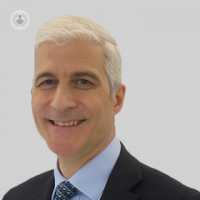Hernia surgery: an essential guide
Autore:The latest topic of discussion today in one of our most recently published medical articles is hernia surgery. Below, Mr Paul Leeder, a highly qualified consultant general surgeon, explains how it is performed, and outlines the important considerations to be taken with regards to undergoing the surgery.

What are the key factors to consider during the preoperative evaluation of a patient scheduled for hernia surgery?
If someone comes to see me with a suspected hernia, I first need to ask them about their symptoms. I also need to ask them if they have noticed any swelling or bulge in the belly button area or the groin.
Are there any specific preoperative tests or diagnostic imaging that should be routinely performed before hernia surgery?
The first thing I would do is examine the patient and a careful examination is carried out. We check to see whether or not the lump is visible and also what happens to the lump when the patient moves. Commonly, GPs organise ultrasound scans and MRI scans to try to diagnose a hernia.
What are the necessary precautions and steps to ensure optimal patient preparation prior to hernia surgery, such as dietary restrictions or medication adjustments?
We have to look at the different pros and cons of the different treatment options. If a patient is overweight, this can be a problem especially if they have a hernia around the bellybutton. Therefore, we normally advise these patients to lose weight.
We also advise patients to stop taking any medication that they may be taking before they undergo hernia surgery. A lot of people think that it’s a good idea to stop exercising if they identify that they have a hernia, but I think that if they find an activity that does not cause them pain, then they should continue with that activity.
Are there any contraindications or specific patient factors that may require additional considerations or modifications in the standard preparation protocol for hernia surgery?
We have to assess the size and position of the hernia. If we see that a large hernia does not go back in, this is something we have to discuss carefully. If a patient notices a recurrent hernia, this also affects what kind of treatment they undergo.
Are there any specific techniques or approaches to hernia surgery?
If a patient does not have any symptoms, then they might not even require surgery. Ultimately though, the only thing that is going to fully get rid of the hernia is hernia surgery. The operation involves repairing the hole to avoid the contents (hernia) pushing through. It is done through a mesh repair.
How we place that mesh differs. Open surgery involves cutting a hole and pushing the hernia back through the hole. The alternative is keyhole hernia surgery which involves small little cuts a good distance away from the hernia to create a small space near the muscle and lay a bit of mesh near the muscle. Finally, a robot can be used as part of keyhole hernia surgery.
To book an appointment with Mr Paul Leeder today, simply head on over to his Top Doctors profile.


